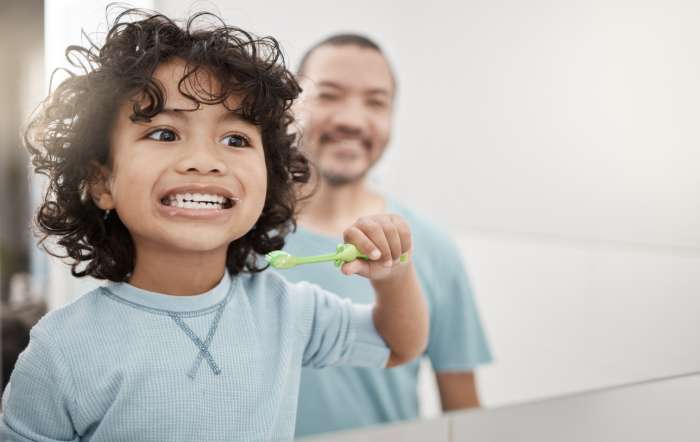What's the point of taking good care of "baby teeth"? After all, they're only going to fall out anyway, right? True, but baby teeth do matter. They determine the placement and spacing of adult teeth and help to develop the jaw and a proper bite.
So, caring for your child's baby teeth is important. Early tooth decay can spread under the gums to the bone, making the bone unable to support adult teeth properly. In addition, early care of the teeth and gums will help form good habits and oral health that will last a lifetime.
Caring for a kid's teeth is a process that requires careful identification of the child’s needs, habits, and developmental landmarks. Dental care is typically straightforward once you understand what to look out for.
When Do Infants Begin To Grow Teeth?
Humans have two types of dentitions in their lifetime. The primary set of teeth that grows in infants and toddlers is also called the deciduous dentition or baby teeth. The secondary set of teeth also called the ‘adult’ or permanent teeth, begin to replace the baby teeth when the child is about 6 years of age.
Typically, infants begin to erupt their teeth around six months of age, beginning with the lower central incisors. Afterward, they erupt other types of teeth until they are two and half years old when their primary teeth completely erupt.
Within this 2-year period, they will erupt 8 incisor teeth, 4 canine teeth, and 8 molars. Although a 3-year-old child is expected to have their full complement of primary teeth, the time at which these teeth erupt is not definite; it is a range that is subject to variations.
Healthy Toddler Snacks That Are Sure To Delight
These healthy snack ideas will delight any toddler when opening their lunchbox. These recipes are all easy and affordable and don’t require any special equipment. Read More
In a rare occurrence, your baby could present with natal or neonatal teeth,, which is when a baby is born with teeth in their mouth or erupts within 30 days of birth.
How Do You Know if Your Toddler's Teeth Are Healthy?

The advice from the American Dental Association is that you should take your child in for a dental visit as soon as their first tooth erupts and is visible in the mouth, but they must have had their first visit to the dentist by the first birthday regardless of eruption. This visit helps you understand the peculiarities of baby teeth and will educate you on what to look out for in your baby’s teeth.
A healthy baby dentition is one that is devoid of cracks, chips, and cavities. In addition, congenital anomalies could result in abnormal tooth shapes or numbers. A visit to the pediatric dentist is necessary if you notice that your toddler has a weirdly shaped tooth or if they have a strange discoloration on the surface of the teeth.
How To Care for Your Child's Teeth
Oral care is mostly a preventive strategy that is rooted in smaller habits that result in significant changes. These habits target daily practices, oral hygiene, and dietary regulation.
Diet
One of the best things you can do to take care of your toddler's teeth is to watch their diet. Encourage your child to drink plenty of milk and eat milk products because they are rich in calcium and vitamin D, which will help form strong and healthy teeth (and bones).
Also, limit the eating of sugar and sweets, which contribute strongly to tooth decay. Not only is water better than juice because juice contains sugar, water may also help wash out other foods from the teeth. Although drinking juice in moderation is fine, make a point to encourage your toddler to drink water too — especially before bedtime.
The sugar you give your toddler after brushing and before bed — in juice or, even worse, in formula — will remain on their teeth until the next day's first brushing. Using pacifiers is strongly discouraged, especially overnight, because they are sometimes coated with sugars and could predispose your child to baby bottle tooth decay.
Dental Hygiene Practices for Your Toddler
Before your toddler erupts their first tooth, it is advised that you clean their gums. This is done by gently wiping your baby's teeth and gums with a washcloth or a small square of damp gauze to get them clean. Make sure to clean the gums properly to remove every form of debris or particle.
Brushing practices are habitual and must be cultivated as a daily routine. Start your child on a small, soft-bristled toothbrush and a smear or smudge of toothpaste not larger than the size of a grain of rice.
When they are up to three years old, brush their teeth with a pea-sized amount of toothpaste. Make sure to use fluoride toothpaste for your child because fluoride in toothpaste helps mineralize and therefore strengthen the teeth.
When helping your child brush their first set of teeth, gently check your toddler’s mouth for any food that’s become stuck in the teeth or along the gum line, and try to remove it using dental floss. If brushing before bed is already stressful enough, try turning it into a game, like pretending that you and your child are at the dentist.
It is important that you help to brush your toddlers teeth for them, as toddlers lack the adequate manual dexterity to do it properly. Brush your teeth in their presence and allow them to imitate you to see how well they do it on their own. Once they are done, inspect the surfaces of their teeth.
Dental examination
The advice from the American Academy of Pediatric Dentistry advises that parents should take their infants for their first dental check-up soon after they have erupted their first tooth. In addition, parents need to look into their child’s mouth from time to time as a form of home examination, and even the children could be taught to look and report any strangeness in their own teeth.
In conclusion, parents need to know that the desire to maintain good dental health throughout life is a gradual process that begins from a very young age. Caring for your toddler’s teeth using the best practices described by professionals is crucial to your child's oral health and overall health.



